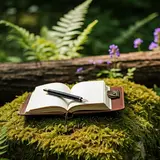Nature's Notebook: The Power of Journaling

In Edutopia’s "Sparking Student Curiosity Through Nature Journaling," Polly Diffenbaugh discusses how nature journaling can be used to engage students in science learning. Nature journaling allows students to develop curiosity and critical thinking skills by encouraging observation. Diffenbaugh provides tips for getting started with nature journaling, including the use of the INIWIRMO framework (I Notice, I Wonder, It Reminds Me Of). She also highlights the benefits of nature journaling for students' overall cognitive development, as well as its potential to encourage environmental stewardship.
Teachers who have used nature journaling know that it offers a multitude of benefits for students' learning and well-being. Teachers can deepen their students’ connection to the natural world by encouraging them to pay attention and record their observations; so nature journaling enhances both observational skills and creativity. It also promotes mindfulness and improves overall well-being through stress-reduction. And nature journaling is an opportunity to demonstrate greater scientific understanding that extends to diverse parts of the curriculum. Teachers can therefore create a more holistic learning experience for their students when they incorporate nature journaling into their lessons.
What opportunities can teachers provide outside of the classroom? Teachers should consider not only their classroom space, but their building, greater facilities, and outdoor spaces.